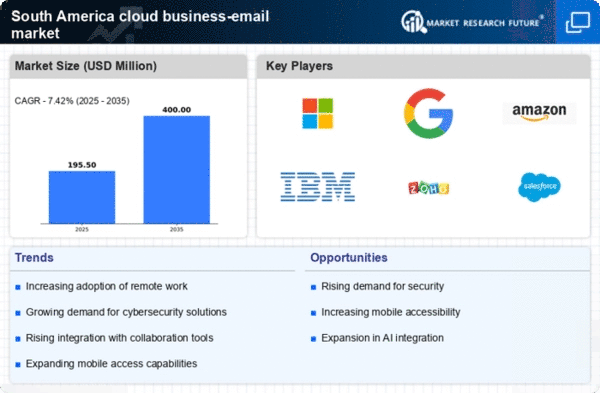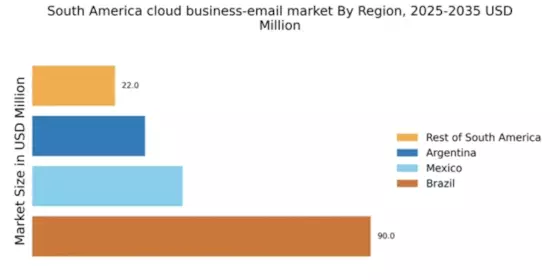Emergence of Local Providers
The emergence of local providers in South America is reshaping the cloud business-email market landscape. These providers often offer tailored solutions that cater to the specific needs of regional businesses, which can enhance user satisfaction. Local providers may also provide competitive pricing and localized customer support, making their services more appealing compared to international competitors. This trend is likely to foster a more diverse market, as businesses increasingly consider local options that understand the unique challenges of operating in South America. The presence of local providers may contribute to a projected market growth of 10% by 2026, as they capitalize on the demand for customized and accessible cloud business-email solutions. This shift not only benefits consumers but also stimulates competition, driving innovation within the cloud business-email market.
Rising Internet Penetration Rates
The cloud business-email market in South America benefits from rising internet penetration rates across the region. As more individuals and businesses gain access to the internet, the demand for cloud-based communication solutions is likely to increase. Recent statistics indicate that internet penetration in South America has reached approximately 75%, with projections suggesting further growth in the coming years. This expanding digital landscape enables businesses to leverage cloud business-email services, enhancing their communication capabilities. Moreover, the proliferation of mobile devices facilitates access to email services, making it easier for users to stay connected. As internet connectivity continues to improve, the cloud business-email market is expected to flourish, driven by the growing number of potential users seeking efficient communication tools.
Shift Towards Cost-Effective Solutions
In South America, businesses are increasingly shifting towards cost-effective solutions, which significantly influences the cloud business-email market. Organizations are seeking ways to reduce operational costs while maintaining effective communication. Cloud business-email services offer a subscription-based model, allowing companies to avoid hefty upfront investments associated with traditional email systems. This financial flexibility is particularly appealing to small and medium-sized enterprises (SMEs) that may have limited budgets. As a result, the cloud business-email market is projected to grow by 20% over the next five years, driven by the demand for affordable and scalable communication solutions. The ability to customize plans based on organizational needs further enhances the attractiveness of cloud business-email services, making them a preferred choice for many businesses in the region.
Growing Demand for Remote Work Solutions
The cloud business-email market in South America experiences a notable surge in demand for remote work solutions. As businesses increasingly adopt flexible work arrangements, the need for reliable and efficient communication tools becomes paramount. This shift is reflected in the rising number of cloud business-email users, which is projected to reach 30 million by 2026. Companies are seeking platforms that facilitate seamless collaboration among remote teams, thereby driving the growth of the cloud business-email market. Furthermore, the integration of advanced features such as video conferencing and file sharing within email platforms enhances user experience, making these solutions more appealing to organizations. The trend towards remote work is likely to continue influencing the cloud business-email market. Companies are prioritizing tools that support productivity and connectivity in a distributed work environment.
Increased Focus on Data Privacy Regulations
In South America, the cloud business-email market is significantly impacted by the increasing focus on data privacy regulations. Governments are implementing stricter laws to protect user data, which compels businesses to adopt compliant email solutions. For instance, the introduction of the General Data Protection Regulation (GDPR) has prompted organizations to reassess their data handling practices. As a result, cloud business-email providers are enhancing their security features to ensure compliance, which may lead to a projected market growth of 15% by 2027. This regulatory landscape creates opportunities for vendors that can offer robust security measures, thereby attracting businesses that prioritize data protection. Consequently, the emphasis on compliance not only shapes the offerings within the cloud business-email market but also influences purchasing decisions among organizations in South America.


















